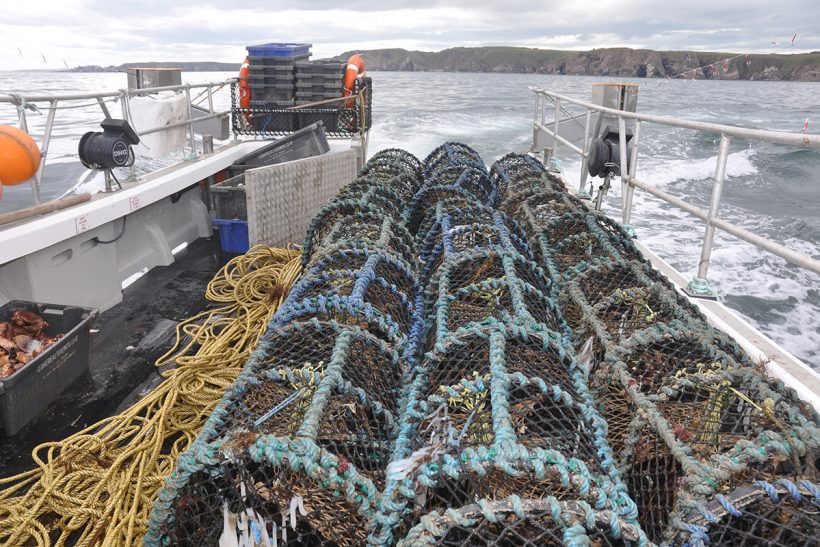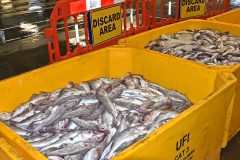‘Shellfish fleet growth must be stopped’
Strong demand and high prices for shellfish are driving an unsustainable increase in catching capacity in the shellfish fleet that must be addressed, reports Tim Oliver
This was the warning voiced by shellfish sector representatives to fisheries minister Robert Goodwill at the recent AGM of the NFFO, where shellfish catching and marketing issues were a major topic.
Trevor Bartlett, a Devon-based shellfish vessel operator and processor, told the minister: “In recent years, the demand for brown crab and whelks in the Far East has seen prices paid to fishermen hit highs we’ve never even dreamt of.
“As a result, orders for new offshore vessels have been unprecedented, and latent capacity licences have been bought up for considerable sums.”
He said it was estimated that in 12 months’ time, UK crab landings will be at least 20% higher than in previous years, due to the extra catching capacity. But until recently, the shellfish sector had been looked on as ‘the poor relation’ in stocks management, science and data collection, and the only management tool currently in place in the offshore fishery was a minimum landing size.
He said that action was now well overdue, and essential to ensure the fishery did not become unsustainable. He urged the minister ‘to delegate a team to pick this up as soon as possible’.
Gary Hodgson, a shellfish processor in Bridlington and chairman of the NFFO’s shellfish committee, agreed that the shellfish sector was secondary to the whitefish sector in terms of management, and told the minister it had suffered ‘20 years of mismanagement’.
He said that conservation measures were inadequate, and that there was no national collaboration around the UK. There were different minimum landing sizes in different areas, as well as inside and outside the six-mile limit, even though catches were being sold in the same markets.
Stressing the importance of the EU market, he said that 98% of Bridlington’s lobsters were exported to Europe. He said that when the UK becomes a third country after Brexit, he did not see the current regulatory system for third-country exports to the EU working for live exports – there was too much bureaucracy, and it was ‘unworkable’.
The minister said that shellfish stocks in his constituency area (Whitby and Scarborough) were healthy, and prices were buoyant. He said that a trade agreement was necessary to prevent a potential 20% tariff on exports of whelks to Korea that would depress the market.
Shellfish tended to be the most sustainable species because they had a high survival rate when returned to the sea, and measures such as V-notching, the banning of the landing of berried lobsters, and the use of escape hatches in pots – though the latter were controversial – helped conservation.
“We must continue to encourage the shellfish industry – the big threat would be a no-deal Brexit, which would be a problem for exports,” he said. A lot of preparatory work had been done on catch and veterinary certificates needed for exports, but he was concerned that with a no-deal Brexit, there would be disruption at the ports. Live crab and live lobster were the most vulnerable of exports to delays from logistical and documentation problems.
But he said that overall stocks were good, and he was optimistic about the future of the sector.
Anne Freeman, head of the domestic fisheries team at DEFRA, said that a shellfish team had been put in place specifically to address management in the sector. The team was looking at overall capacity in the shellfish sector, and there was ‘a lot of work to do’.
“We will be taking action to make sure fishing is sustainable,” she told delegates.
John Balls, chairman of North Devon Fishermen’s Association, raised the issue of the security of shellfish exports to the EU. He asked what the government’s stance was on the protection of lorries carrying shellfish exports, and their drivers. “Is there a contingency plan in place?” he asked.
The minister said that the short answer was yes, and that there are 2,500 people in DEFRA working on Brexit. Exports were a key area, and a no-deal Brexit would not be good for the industry.
With a deal, there would be an implementation period, he said, and ‘we need to leave the EU in an orderly way’. However, there were contingency plans to provide catch and health export certificates in the event of no deal.
He said he hoped that MPs would ‘come to their senses, and vote for the withdrawal agreement that would enable us to get to the next stage of negotiating the details’.
A no-deal Brexit would be bad for fishermen, agriculture, and any other area in his ministerial remit, he said. There would be a whole range of issues to sort out, and that was the point of the implementation period. “We need long-term trading agreements and frictionless trade,” he said.
See pages 6 & 7 of this week’s Fishing News for further details of NFFO AGM.






